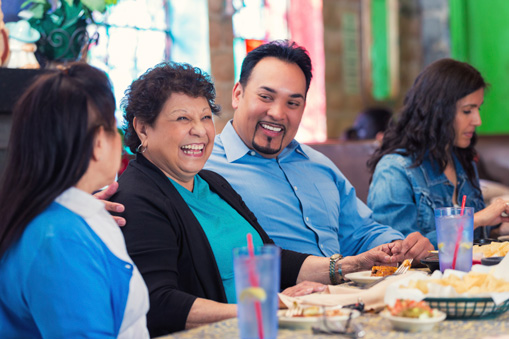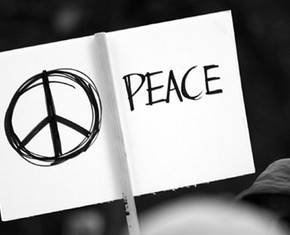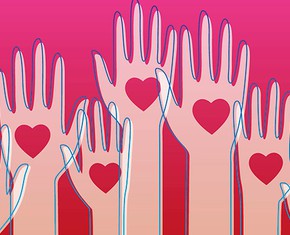The views expressed in our content reflect individual perspectives and do not represent the authoritative views of the Baha'i Faith.
The context that restores community is one of possibility, generosity, and gifts, rather than one of problem solving, fear, and retribution. – Peter Block
A healthy community is never a product of circumstances. It is rather a fruit of oneness in heart in the spirit of true neighborhood. – Newton Kibiringi
I ask you, is not fellowship and brotherhood preferable to enmity and hatred in society and community? The answer is self-evident. Love and fellowship are absolutely needful… We must be united. We must love each other. – Abdu’l-Baha, Foundations of World Unity, p. 99.
What makes a thriving, healthy, smoothly-functioning community?
Many people would answer that good leadership creates good communities. Others might say that geography and a shared history bring a community together. Some believe that groups which share similar class or race or socio-economic backgrounds have the most successful community life.
But increasingly, both religion and science look beyond those elements to one that you might not have thought of immediately—the quality of the relationships in a community.
The Harvard public policy professor and author Robert Putnam, in his book called Bowling Alone, writes that our modern society has suffered a “collapse of community.” Putnam presents evidence that we meaningfully connect with each other less than ever before; we belong to fewer social  organizations, religious groups and clubs; we even have 43% fewer family dinners than we did a few decades ago. This has happened, Professor Putnam concluded after a significant amount of research, because of longer work hours, changes in generational and family structure, the fact that most people now live isolated from one another in cities and suburbs, the influence of television and the Web, and many other factors.
organizations, religious groups and clubs; we even have 43% fewer family dinners than we did a few decades ago. This has happened, Professor Putnam concluded after a significant amount of research, because of longer work hours, changes in generational and family structure, the fact that most people now live isolated from one another in cities and suburbs, the influence of television and the Web, and many other factors.
How do we fix those problems? How can we bring a sense of connectedness and cooperation back into our culture? Putnam and many others say that we can generate trust, reciprocity, information flows and quality social cooperation by coming together in unity for the good of our communities.
Sociologists call this overall concept “social capital”—the idea that we all derive individual, collective and even economic benefits from the connections we build among our social networks.
Social capital comes from building belonging with others, from weaving together a tapestry of caring relationships, creating a genuine sense of unity, mutuality and cooperation. It shows us that we’re not alone, that we don’t have to stand up to the world and its problems as a single, isolated individual, but can instead unify as a group to face our common challenges. It allows us to collectively own our issues as a community, rather than expecting others to take care of them for us.
So how do you build social capital? Simple: find a community that shares your beliefs and get to know those people. Then give of your time and talents to help, and that expenditure of energy will come back to you, increased exponentially. You will not only build social capital, you’ll contribute to the good of the community and advance the higher goals of society. You’ll also begin to lose the sense of alienation you may have felt previously, and start generating new feelings of belonging, love and connection you never expected to encounter. The act of building social capital, which includes all of those elements, can also include a significant amount of fun, laughter and joy.
Scientists and researchers increasingly agree that all good societies rest on some kind of shared moral culture. Building social capital works best when that moral culture produces a purposeful, productive joint experience, which then leads to a sense of cohesion, unity and mutual, sustainable caring for one another.
The Baha’i teachings say that this kind of social capital best occurs when each person equates their own welfare with the community’s welfare, when we recognize our role as one cell in the body of humankind. This kind of selfless devotion to others can then become an attribute of spiritual perfection, Abdu’l-Baha tell us, which exemplifies:
…justice and impartiality. This means to have no regard for one’s own personal benefits and selfish advantages, and to carry out the laws of God without the slightest concern for anything else. It means to see one’s self as only one of the servants of God, the All-Possessing, and except for aspiring to spiritual distinction, never attempting to be singled out from the others. It means to consider the welfare of the community as one’s own. It means, in brief, to regard humanity as a single individual, and one’s own self as a member of that corporeal form, and to know of a certainty that if pain or injury afflicts any member of that body, it must inevitably result in suffering for all the rest. – Abdu’l-Baha, The Secret of Divine Civilization, p. 38.
Want to begin building social capital? Do a little research, talk to others, identify a group of like-minded people who share your beliefs and offer to participate and help. Don’t do it solely for your own benefit—do it for the benefit of all. That will inevitably produce new learning, new relationships and new spiritual energy. The time and effort you expend will generate reciprocal sacrifice and selflessness in others, and when that happens you’ll become the beneficiary of those selfless efforts.
The Baha’i community welcomes anyone who would like to join in and help with our global community-building efforts. Baha’is everywhere try to carry forward an ever-advancing civilization in the quest for human harmony and an end to war. If you want to work with others toward racial unity, global peace and the oneness of humanity, we would love to meet you.
















Comments
Sign in or create an account
Continue with Googleor